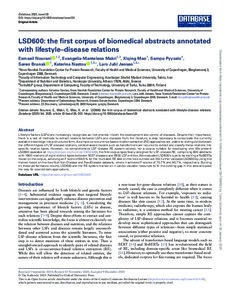LSD600: the first corpus of biomedical abstracts annotated with lifestyle–disease relations
Nourani, Esmaeil; Makri, Evangelia-Mantelena; Mao, Xiqing; Pyysalo, Sampo; Brunak, Søren; Nastou, Katerina; Jensen, Lars Juhl
LSD600: the first corpus of biomedical abstracts annotated with lifestyle–disease relations
Nourani, Esmaeil
Makri, Evangelia-Mantelena
Mao, Xiqing
Pyysalo, Sampo
Brunak, Søren
Nastou, Katerina
Jensen, Lars Juhl
Oxford University Press (OUP)
Julkaisun pysyvä osoite on:
https://urn.fi/URN:NBN:fi-fe2025082791500
https://urn.fi/URN:NBN:fi-fe2025082791500
Tiivistelmä
Lifestyle factors (LSFs) are increasingly recognized as instrumental in both the development and control of diseases. Despite their importance, there is a lack of methods to extract relations between LSFs and diseases from the literature, a step necessary to consolidate the currently available knowledge into a structured form. As simple co-occurrence-based relation extraction (RE) approaches are unable to distinguish between the different types of LSF-disease relations, context-aware models such as transformers are required to extract and classify these relations into specific relation types. However, no comprehensive LSF-disease RE system existed, nor a corpus suitable for developing one. We present LSD600 (available at https://zenodo.org/records/13952449), the first corpus specifically designed for LSF-disease RE, comprising 600 abstracts with 1900 relations of eight distinct types between 5027 diseases and 6930 LSF entities. We evaluated LSD600's quality by training a RoBERTa model on the corpus, achieving an F-score of 68.5% for the multilabel RE task on the held-out test set. We further validated LSD600 by using the trained model on the two Nutrition-Disease and FoodDisease datasets, where it achieved F-scores of 70.7% and 80.7%, respectively. Building on these performance results, LSD600 and the RE system trained on it can be valuable resources to fill the existing gap in this area and pave the way for downstream applications. Database URL: https://zenodo.org/records/13952449.
Kokoelmat
- Rinnakkaistallenteet [29335]
